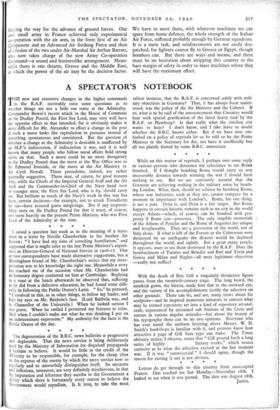A SPECTATOR'S NOTEBOOK
r HE new and extensive changes in the higher commands in the R.A.F. inevitably raise some questions as to whether things are not• a little too static at the Admiralty. Commander Bower's recent attack in the House of Commons on Sir Dudley Pound, the First Sea Lord, may very well have the opposite effect to that intended, for it obviously makes it more difficult for Mr. Alexander to effect a change in the post if such a move looks like capitulation to pressure instead of something spontaneous and considered. But the question of whether a change at the Admiralty is desirable is unaffected by an M.P.'s indiscretion, if indiscretion it was, and it is well known that many people who follow naval affairs hold strong views on that. Such a move could be no more derogatory to Sir Dudley Pound than the move at the War Office was to Sir Edmund Ironside, or the move at the Air Ministry to Sir Cyril Newall. Those precedents, indeed, are rather pointedly suggestive. There may, of course, be good reasons why, while the Chiefs of the Imperial General Staff and the Air Staff and the Commander-in-Chief of the Navy hand over to younger men, the First Sea Lord, who is 63, should carry on. But brilliant as much of the Navy's work in this war has been, certain decisions—for example, not to attack Trondheim by sea—have aroused grave misgivings. But if any responsi- bility rests on Sir Dudley Pound for that it must, of course, rest more heavily on the present Prime Minister, who was First Lord of the Admiralty at the time.


























































 Previous page
Previous page